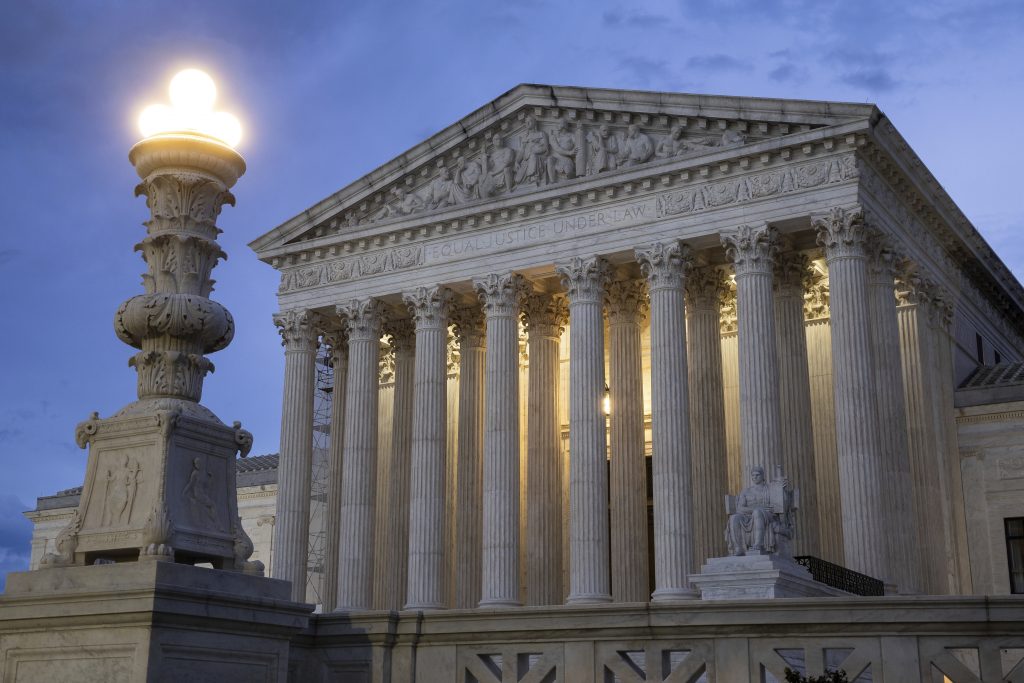The U.S. Supreme Court heard arguments Thursday over whether Colorado may disqualify former President Donald Trump from appearing on the 2024 ballot.
Last year, a group of Colorado voters eligible to vote in the state’s presidential primary filed a lawsuit arguing that Trump should not appear on the ballot, because he engaged in insurrection during the Jan. 6 Capitol riot, in violation of a constitutional provision. In December 2023, a fractured Colorado Supreme Court ruled 4-3 that Trump be disqualified from appearing on the state’s Republican primary ballot.
The Colorado justices ruled that Trump violated Section III of the 14th Amendment for “[engaging] in insurrection” during the Jan. 6 attack. Section III, enacted a few years following the end of the Civil War, holds that any person who served as an “officer of the United States” and previously swore to uphold the Constitution is prohibited from running for office if they “engaged in insurrection.” The Colorado Republican Party and Trump appealed to the U.S. Supreme Court in early January, urging the justices to reverse the Colorado decision.
Trump’s legal team has put forth numerous arguments to support their claim that states cannot use the 14th Amendment to exclude the former president from the ballot. In a brief before the Supreme Court, Trump’s lawyers asserted that the president is not an “officer of the United States” under Section III. Even if the president is an “officer” under the 14th Amendment, his lawyers also argue that Trump did not “engage in insurrection” during the violent attack on the Capitol and that state courts cannot disqualify federal candidates unless Congress enacts legislation allowing them to do so.
After more than two hours of arguments, a majority of the justices appeared likely to reject Colorado’s arguments. Chief Justice John Roberts, who was appointed by former President George W. Bush in 2005, questioned why it would be conceivable that the 14th Amendment — enacted shortly following the Civil War to “restrict state power” and increase the power of the federal government — would permit states to decide whether candidates should be disqualified from a presidential election.
“I mean, the whole point of the 14th Amendment was to restrict state power, right?” Roberts said. “States shall not abridge privilege of immunity, they won’t deprive people of property without due process, they won’t deny equal protection. So wouldn’t that be the last place that you’d look for authorization by the states, including Confederate states, to enforce — implicitly authorize to enforce — the presidential election process.”
Several of the Court’s Democratic-appointed justices also appeared skeptical of Colarado’s case. Justice Ketanji Brown Jackson, who was appointed by President Joe Biden in 2022, questioned whether those who drafted Section III intended it to apply to the presidency. Justice Elena Kagan, appointed by former President Barack Obama in 2010, expressed concern over the ramifications of allowing states to assume broad control over federal elections.
“I think that the question that you have to confront is why a single state should decide who gets to be president of the United States,” Kagan said. “Why should a single state have the ability to make this determination not only for their own citizens but for the rest of the nation?”
Arguing on behalf of the Colorado voters who challenged the former president’s eligibility, attorney Jason Murray stated that Section III’s language is broad and applies to candidates running for elected offices, including the presidency. Murray argued that Trump “disqualified himself” from seeking the presidency because of his actions on Jan. 6.
Thursday’s oral arguments came two days after a federal appeals court rejected Trump’s claim that he is immune from prosecution, ruling that a former president can be prosecuted for actions committed while they were in office. In the Colorado case, many of the justices sidestepped whether Trump actually participated in an insurrection — instead focusing their attention on other arguments.
It remains unclear when the Supreme Court will issue a final decision in the case. Wendy Martinek, a professor of political science at Binghamton University, emphasized that the Court’s final decision will have broader legal ramifications beyond 2024.
“This case has enormous implications,” Martinek wrote in an email. “Obviously, it will affect the upcoming presidential election. But there are also issues of federalism at stake. The Court’s decision will structure the role states have in controlling ballot access.”



